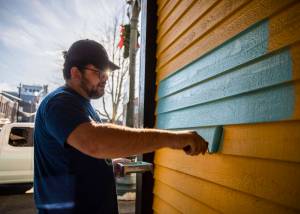7 years for driver in fatal DUI crash south of Arlington
Published 1:30 am Saturday, August 1, 2020
EVERETT — At first, Tanya Jefferson didn’t realize she had been in a crash south of Arlington in March 2019.
Prosecutors wrote that she had somehow gotten out of the vehicle and was standing in front of a house near the intersection of 67th Avenue NE and 152nd Street NE. She walked toward Snohomish County sheriff’s deputies and then collapsed.
When she regained consciousness, she saw her van flipped onto its roof, crumpled, with her and her husband’s belongings splayed onto the road. They had been living out of the van and were looking for a place to park and sleep that night, Jefferson wrote in a victim statement read aloud in Snohomish County Superior Court on Thursday.
Jefferson, who was 49 at the time, didn’t know where her husband was. Later, she’d find out he suffered a traumatic brain injury.
John Jefferson, 41, likely never regained consciousness, prosecutors wrote in charging papers. Tanya Jefferson said she had to make the choice to take him off life support four days after the crash.
“If police had been called sooner, my husband may have had a chance,” Tanya Jefferson wrote. She herself had suffered injuries, including fractures in her spine, nose, face and pinky finger.
Christopher Konnoff, 21, was sentenced Thursday in Snohomish County Superior Court to 7 years and 1 month in prison — the low end of the sentencing range under state guidelines. He pleaded guilty in January to vehicular homicide and being involved in a hit and run death.
Prosecutors say he was driving an Audi A4 early in the morning on March 16, 2019 when he rear-ended the Jeffersons’ van. It was dark out and he was going down a stretch of rural, mostly empty roadway.
The Lake Stevens man fled. A deputy found him a couple hours later, walking down 152nd Street and trying to catch a ride. He was wet, muddy, smelled of alcohol and his speech was slurred, according to court papers.
At first he claimed a friend had dropped him off, but eventually said he was driving the Audi, according to charging papers. He said the van stopped abruptly and that he didn’t have time to stop. He ran because he was scared, he said.
Deputy prosecutor Tobin Darrow said there was no evidence the van had stopped abruptly.
Eight hours after the crash, when detectives obtained a search warrant, the defendant’s blood-alcohol test came back as 0.11. The legal limit is 0.08. The test also came back positive for THC, the active ingredient in marijuana.
On Thursday, defense attorney Laura Shaver argued for an exceptional sentence below state guidelines, of 5 years. She said Konnoff’s youth made him more impulsive, and therefore less culpable.
Shaver also said the speeds of both vehicles played a role in the severity of the crash. She cited a defense expert’s testimony indicating the Jeffersons’ van was going 21 to 32 mph in a 50 mph speed zone, while Konnoff was going 64–72 mph.
Who was driving the van was initially unclear, according to prosecutors. A sheriff’s deputy initially reported it was John Jefferson who had been driving. Tanya Jefferson confirmed in her statement she was the driver.
Shaver also mentioned that Konnoff was a young father, and that he graduated high school while he was in jail, suggesting he’d succeed in his rehabilitation.
Judge Janice Ellis denied the request. She said Konnoff made the choice to drink, smoke marijuana and drive. He also made the choice to speed, she said.
“Each one is a selfish act, and in this case led to catastrophic results,” she said.
It also appeared clear Konnoff knew what he did was wrong, since he left the scene and later tried to downplay his role in the crash, Ellis said. The judge lectured that every time someone gets behind the wheel of a car, they take on the responsibility to drive in a manner that ensures everyone gets home safely.
“Your decisions, three days shy of your 20th birthday, flagrantly ignored that responsibility,” Ellis said.
Speaking to the court, Konnoff said he was remorseful for his role in the loss of John Jefferson’s life. He said it was a mistake he would have to pay for and live with for the rest of his life. He didn’t ask for forgiveness, because that would be selfish, he said.
John Jefferson’s son spoke, too. He had few words for the court, though appeared to express some sympathy for the defendant, and the fact he has a son he is now separated from.
“We’re all hurting here,” Leon Jefferson said. “We’re all hurting here.”
Zachariah Bryan: 425-339-3431; zbryan@heraldnet.com. Twitter: @zachariahtb.




